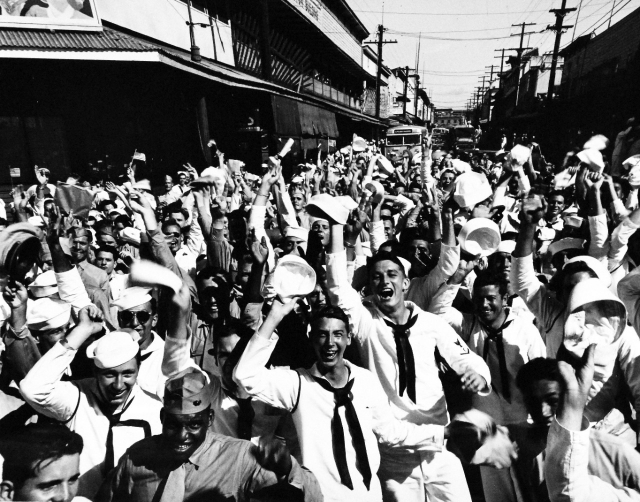VJ Day: 75 Years On
Remembering Victory in Japan day

On its 75th anniversary, historian Paula Kitching reflects on the significance of and events leading up to VJ Day in 1945. You can also listen to our new podcast on post-war Japan which explores the topic in further detail.
15 August is VJ Day – Victory in Japan – and marks the official surrender of the Japanese to the Allies in 1945, ending the fighting of the Second World War. The unconditional surrender of Japan was accepted shortly after the United States had dropped two atomic bombs on the Japanese cities of Hiroshima on the 6 August and Nagasaki on the 9 August 1945. Thus ended three and a half years of fighting for the Allies in the Pacific area where millions of men and women had been killed, where hundreds of thousands of troops had fought, been killed and captured, and where cities and communities had been left devastated.
Japan had formally entered into the Second World War on the 27 September 1940 when it signed the Tripartite Pact with Germany and Italy.
Japan had begun its expansion across China and South Asia long before it had formally entered into the war, which had been demonstrated by increasingly hostile attitudes to the European communities and authorities in the region. However, even with the formal Pact the real conflict between Japan and the Allies did not begin until December 1941 when Japanese Forces attacked the US Naval Fleet at Pearl Harbour. That attack resulted in the United States entering into the Second World War and also began the Japanese invasion of the Allied territories of Singapore, Hong Kong, Malaya, Borneo, Guam and the Philippines.
Thousands of British Forces were involved with some of the most brutal fighting and some of the harshest of conditions of the whole of the Second World War in that region. The men and women that served included thousands of local troops (or colonial troops as they were then termed) soldiers from India (including modern day Pakistan and Bangladesh), Nepal, Burma and Singapore. The tactics as well as the conditions of fighting in that region meant that many people would never recover from their war experiences of fighting in the Far East.
The Imperial Japanese Forces were brutal occupiers enabling the Allied troops in that region to at least find willing support on the ground for their push back against the invading Japanese forces. However, the Japanese are perhaps now most often characterised by their very harsh treatment of Prisoners of War, many of whom were beaten, starved and worked to death.
The last year of the war saw the Japanese slowly being pushed back by the Allied soldiers after their initial success in expanding into the region. The Japanese defeat at the Battle of Kohima and Imphal (April – June 1944) by British Forces stopped an attempt to invade India and demonstrated an Allied gritted determination to force the Japanese back.
By spring 1945 it looked like Japan could surrender just as Nazi Germany was about to, but the Japanese continued onwards, even after their allies were beaten. At the Potsdam Conference in July 1945 the Allies all agreed that only an unconditional surrender from Japan would end the war, which the Japanese were reluctant to give. In the end the United States took the somewhat controversial decision to drop atomic bombs onto Japanese cities, and within day the Japanese Emperor went on the radio to state that his country had given an unconditional surrender and allowed Allied occupiers to the country.
It would not be until September that a formal written treaty of the end of the war would be signed, but 15 August marked the acknowledgement that the fighting was over. The Japanese defeat would lead to a rebalancing of power, influence and trade across the Pacific region in the post-war years, the legacy of which had a significant impact on Cold War activities and on political and trade relationships today.
However, for the men and women who fought and lived through that time and in that region the real significance of VJ Day was an end to the fighting and a chance at peace.
Don't forget to take a look at our new podcast on post-war Japan which is open access until the end of this month. In this podcast Dr Adam Bronson of Durham University will examine the state of Japan after the war, reconstruction, economical expansion, Japan's changing role in the post-war world, perceptions, and how Japan's role in the Second World War and Cold War continues to impact its relation with its neighbours.

